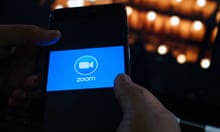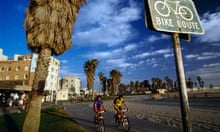Weeks after Proposition 22 went into effect in California and exempted some major tech firms from fully complying with labor laws, workers for rideshare and delivery apps in the state claim poor working conditions have persisted and pay has decreased.
Drivers and labor groups opposed Prop 22, saying it would allow companies to sidestep their obligations to provide benefits and standard minimum wages to their workers even as they make billions of dollars. But the measure passed at the ballot box.
“It’s clear that as soon as Prop 22 passed, it was open season to start cutting my pay again,” said Peter Young, a rideshare driver for four years in Los Angeles. “I’m looking for other work. I can’t keep doing this at this pay. I’m doing food delivery right now. Everyone is ordering food online so there’s demand. It’s just that what they are choosing to pay me isn’t reliable any more and it’s getting lower.”
When the coronavirus pandemic started, Young switched from rideshare driving to relying on food delivery apps such as Uber Eats, Grubhub, and the Uber-owned Postmates. After Prop 22 passed, he claimed incentives offered to drivers ahead of the Prop 22 vote disappeared, and he has experienced cuts to his base pay amid unreliable fluctuations.
“If you try to earn money, just purely on the delivery fee, it comes out to about $5 an hour. A good day for me is maybe earning $100 before gas and expenses off eight hours of work,” said Young.
The minimum wage in California is $14 an hour as of January 2021, and $13 an hour for employers with less than 25 employees.
Ben Valdez has worked part-time as an Uber driver in Los Angeles for five years and continued through the pandemic. He works two to three days per week, 12 to 15 hours per day, and on average makes about $150 per day before expenses, but the pay has continued to vary widely.
“I’ve had maybe three or four nights where I literally made $4,” he said.
Through the pandemic, Valdez has paid for things like face masks and other personal protective equipment out of his own pocket and built his own protective partition in his vehicle out of a shower curtain.
“I was under the impression that I was going to get an additional $0.30 per mile after Prop 22,” said Valdez, but he hasn’t received that extra compensation because, according to Uber’s metrics, his pay exceeds their calculation of 120 percent of minimum wage.
A study by labor economists at the University of California, Berkeley, in October 2019 found Prop 22 guarantees a minimum wage of $5.64 an hour, as only engaged time is accounted for in the wage calculations.
“A lot of drivers were duped because they expected they were magically going to be able to qualify for benefits that the companies made it sound like they were going to pay for up front and that drivers were going to be getting reimbursement for the mileage,” said Valdez. “They also made drivers believe that if Prop 22 didn’t pass then Uber and Lyft were going to leave the state of California because they couldn’t afford to pay drivers as employees.”
In November, California voters passed Prop 22, with 58.63% of voters in favor of the amendment to exempt app-based gig workers from California assembly bill 5, which granted gig workers the rights of employees such as unemployment insurance, health insurance, minimum wage, and collective bargaining. Uber, Lyft, and other gig companies refused to comply with AB5 and threatened to shut down operations in the state of California if they were forced to do so.

Prop 22, authored by Uber, Lyft, Instacart, and DoorDash, went into effect in mid-December 2020 after an aggressive public relations campaign of more than $200m launched by the companies. The companies outspent opponents to Prop 22 by 10 to one, making it the most expensive ballot measure in California’s history.
Disputes over Prop 22 continue in the wake of its passage.
Shortly after it passed, several gig apps announced fees for customers in California would increase to cover the costs of Prop 22 driver benefits after several of the apps claimed prices would hike if Prop 22 didn’t pass.
The California Fair Political Practices Commission recently proposed a $3,371 fine against Lyft for deceptive and improperly labeled campaign ads in support of Prop 22.
A class action lawsuit was permitted to proceed against Uber, filed by 4,800 drivers demanding back pay and benefits as the rideshare company refused to comply with AB5 before Prop 22 passed. On 10 February, the California supreme court declined to review a lower court ruling against Uber and Lyft over the classification of their drivers as employees before Prop 22 passed.
Rideshare drivers and the Service Employees International Union have filed a lawsuit claiming Prop 22 is unconstitutional because it prevents the California legislature from providing workers’ compensation to workers for the apps.
One of the drivers who filed that lawsuit, Saori Okawa, worked as a full-time Uber driver in San Francisco for a year and was also working for Instacart and DoorDash when the coronavirus pandemic hit.
“Prop 22 hasn’t made anything better because the companies still don’t take into consideration the waiting time and driving time to stores, so their guaranteed 120 percent of minimum wage is fraudulent,” said Okawa.
She pays about $180 a week to rent a car through Uber’s partnership with Avis and spends about $90 on gas a week. She works five to six days a week from 7.30am to 6pm. She claimed the gig companies had changed base pay without giving a reason and she was still not provided adequate personal protective equipment while working during the pandemic, or compensated for the time she spent daily disinfecting her vehicle and herself.
“I’m scared and pray I don’t get coronavirus because that means being out of work for weeks without any financial support,” said Okawa.
A spokesperson for DoorDash said in an email: “We’re proud that DoorDash provides flexible earning opportunities for Dashers to supplement their income, and Prop 22 demonstrates that we can pair the independence Dashers want with even greater security. Following the implementation of Prop 22, Dashers in San Francisco are making more than $39 per hour that they’re on a delivery, and Dashers for the first time are able to earn money toward health insurance under this groundbreaking legislation.”
The spokesperson also claimed 90% of workers on DoorDash work fewer than 10 hours per week on the app, and on average dashers deliver less than four hours per week.
A Grubhub spokesperson said: “The new benefits from Prop 22 include earnings guarantees, healthcare subsidies and new insurance protections. Overall, Prop 22 ensures benefits for Grubhub drivers while protecting the flexibility they value. Regarding earnings specifically, drivers in California have more stability now with guaranteed earnings that are based on 120% of the local minimum wage, and total active delivery time.”
Uber, Postmates, and Instacart did not respond to multiple requests for comment on this story.









